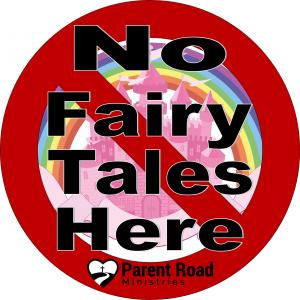The bunnies and eggs of Easter might fool us into thinking what really happened isn’t true, BUT the real story of the resurrection is no fairy tale.
Video transcript:
…and they all lived happily ever after. The End.
How many stories do you know that end that way? Mostly fairy tales, don’t you think? What are some of your favorites? I like a lot. I like Cinderella. I like The Princess and the Pea. I love fairy tales.
 Bunnies and eggs are not the real story of Easter.
Bunnies and eggs are not the real story of Easter.
But, you know what? The bunnies and the eggs of Easter sometimes fool us into thinking that the real story of Easter is a fairy tale too. Guess what? It’s not. In fact, Easter is about how Jesus died on the cross and rose again. He came back to life to pay for our sins. That is no fairy tale.
Second Peter 1, verse 16 says, “we did not follow cleverly invented stories when we told you about the power and coming of our Lord Jesus Christ, but we were eyewitnesses of his majesty” (NIV).
 “we did not follow cleverly invented stories” 2 Peter 1:16
“we did not follow cleverly invented stories” 2 Peter 1:16
They saw for themselves who Jesus was. They walked with Him. They talked with Him. They shared meals with Him. They could ask Him questions; give Him high-fives and fist-bumps (if they did that back then). They also saw Jesus die on the cross. But, they saw Him really come back to life too. And after He came back to life, He talked with them and He ate with them. He even went fishing with some of His friends. We know Jesus is no fairy tale.
 We know Jesus is no fairy tale.
We know Jesus is no fairy tale.
We will be talking about that more this month on our website, so be sure to check out our blog at parentroadmin.com. Have a blessed day and happy Easter!
Related Posts:
- Why Is Good Friday “Good”?
- The Danger of Good Friday Suspense
- A Prayer for Families This Easter
- Dig In Devo: Why Celebrate Easter?
- What do bunnies and eggs have to do with Easter?
- Dig In Devo: Eyewitnesses of Jesus’ Resurrection
Join the E-Team!
The PRM E-Team is a growing community of families and children's leaders who want to see kids living for Jesus. If you want regular encouragement, family Bible studies, exclusive freebies, resources, and behind the scenes happenings, join us because ONLY the E-Team receives these exclusives!
3 Comments
Leave a Comment






Easter is a Pagan fertility holiday. It is the worship of the goddess Ishtar, by the Anglo-Saxon nation. Known as Istra by the Norse.
The rabbit and the egg are well established fertility symbols and are used to symbolize Ishtar/Istra.
The worship of the fertility goodness originated in Babylonian with the myth of a large egg falling from the sky into the Euphrates River, from which the goddess Astarte was hatched. Astarte was revered by the ancient Phoenicians as the goddess of the moon and the measurer of time.
Later pagan cultures celebrated this holiday with orgies and sacrificing of children. The tradition of dyeing the egg pretty colours started with dipping the eggs in the blood of the sacrificed children’s blood.
God told Moses to warn the ancient Israelites that they were to make worship other gods, Exodus 23:13.
Exodus 23:13
“And in all things that I have said unto you be circumspect: and make no mention of the name of other gods, neither let it be heard out of thy mouth.”
King James Version (KJV)
Is it a coincidence that pagan cultures from around the world have celebrated and practiced their holidays of fertility at the time or Easter?
No.
Is Easter even mentioned in the Bible?
Yes, in Acts 12:4.
Acts 12:4
“And when he had apprehended him, he put him in prison, and delivered him to four quaternions of soldiers to keep him; intending after Easter to bring him forth to the people.” (KJV)
Was Easter used in a positive or negative context?
Negative. King Herod, a pagan, celebrated Easter. It is false that was word Easter should have been written as Passover in the text. It was indeed Easter he was celebratimg, not the Passover and not the Feast of Unleavened Bread.
Yes, Jesus Christ did die for our sins and was resurrected three days after He died on the cross. Thus, also making the Easter to timeline provided by the Vatican to be false. The Vatican timeline cuts down the days Jesus was in the tomb by a day. Think about. Count the days.
If you celebrate Easter, who are you really worshipping?
Not Jesus. Not the Most High God, not the only living God in Heaven.
God was very clear though our the Bible of worshipping false gods. So much so, it is one of the Ten Commandments, Exodus 20:3. In fact, it is the first commandment.
Exodus 20:3.
“Thou shalt have no other gods before me”. (KJV)
In conclusion, you are correct, Easter is not a fairy tale. Easter is a pagan holyday that goes back to the Babylonian pagan worship of the goddess Astarte.
That’s right, Tricia. The early church tried to connect with more people by changing pagan holidays into Christian ones (like Easter and Christmas). As a result, the differences between the two got a bit tangled. I like the way some Christians are trying to separate the two once again, but I understand how hard it is to change tradition in some families. I think the main thing is to keep Christ as the center of the celebration, no matter what you call it.
Thank you for adding to this discussion!
*”Easter is a Pagan fertility holiday. It is the worship of the goddess Ishtar, by the Anglo-Saxon nation.” (Proof Please) ”*Known as Istra by the Norse.” What resources present the spelling ”Istra?”
*”The rabbit and the egg are well established fertility symbols and are used to symbolize Ishtar/Istra.” (No ancient inscriptions, literature or carvings show eggs or bunnies) What historical sources support this idea?
*”Negative. King Herod, a pagan, celebrated Easter. It is false that was word Easter should have been written as Passover in the text.” The KJV doesn’t state that Herod was celebrated Easter.
Acts 12:3 And because he saw it pleased the Jews, he proceeded further to take Peter also. (Then were the days of unleavened bread.) Passover, the meal held on the 14th day of the month of Nisan on the Hebrew calendar, was immediately followed by The Feast of Unleavened Bread is to start on the 15th day of Nisan, the same month as Passover, at twilight.
The word in Acts 12:4 is Pascha or Passover.